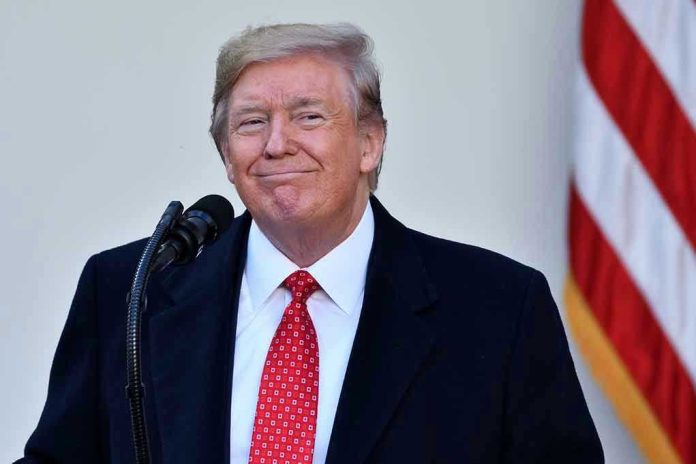
Imagine a sitting president’s family selling their own wine—tax-free—straight to the military, right inside federal stores, and you start to see why ethics watchdogs are sounding the alarm louder than ever.
Story Snapshot
- Trump-branded wine and cider are now sold at Coast Guard-run military exchanges in D.C. and Virginia, tax-free for service members.
- Watchdog groups and media raise ethical and optics concerns about the Trump family monetizing federal facilities while in public office.
- The arrangement is legal but spotlights a growing pattern of the Trump family’s commercial interests intersecting with public service.
- The incident revives debate about conflicts of interest and the Emoluments Clause in American government.
Trump Wine on the Government’s Dime: The Unprecedented Sales
Early November 2025 marked a new chapter in America’s uneasy relationship with presidential business interests. Reports surfaced that Coast Guard-run exchanges in Washington, D.C., and Virginia had begun selling Trump-branded wine and cider—products from the Trump Winery in Virginia, a property valued at over $40 million and managed by the Trump Organization. For military members and their families, these beverages became available tax-free, right where they typically shop for essentials. The arrangement, confirmed by Homeland Security, instantly triggered a national debate about boundaries, ethics, and the commercialization of the presidency.
Military members offered Trump wine as First Family’s latest cash grab hits shelves – Yahoo News Canada https://t.co/5vhmym8lp2
— Mike (@mikejonesxxxx) November 9, 2025
Watchdogs and journalists quickly questioned the wisdom—and the optics—of allowing a sitting president’s family to profit from sales on federal property. The Department of Homeland Security, seemingly unfazed by the controversy, declared: “The brave men and women of the USCG are pleased to be able to buy Trump wine and cider tax-free.” The Trump Organization’s online retail arm, meanwhile, ramped up marketing efforts, openly pushing products tied to the First Family’s brand. Critics, including Citizens for Responsibility and Ethics in Washington (CREW), warned this was not just a legal gray area, but a full-blown ethics crisis: “There probably isn’t any legal issue, but there is an optics and an ethics issue.”
Ethics, Law, and the Blurring Line Between Public and Private
Federal law, including the U.S. Constitution’s Emoluments Clause, prohibits officeholders from receiving extra benefits from domestic or foreign sources. Yet, the Trump Organization’s business structure, with Donald Trump Jr. as trustee of the controlling trust, enables the family to reap financial rewards while maintaining nominal separation from official duties. The Coast Guard Exchanges are designed to serve the military community, not to enrich public officials—making the sale of Trump-branded products in these venues a jarring precedent. CREW’s Jordan Libowitz captured the mood: “You don’t want to see the military essentially playing sides. Are they going to try to make money for other presidents? It’s a weird thing.”
Legal scholars and ethics experts agree that while no explicit law appears to have been broken, the incident raises substantial questions about the normalization of public office for private gain. The debate is not new. During Trump’s first term, critics flagged similar concerns over hotel stays by foreign dignitaries and branded merchandise promoted at federal events. But the direct sale of luxury goods to service members, in government spaces, is a step further, threatening to erode public trust in the impartiality of federal institutions.
Implications for Military, Politics, and the American Public
For military families, the Trump-branded wine controversy is more than a headline; it’s a real-time test of the government’s commitment to neutrality. The Coast Guard Exchanges’ role as federal stores serving the military makes them a symbol of the state itself—one that now carries the branding of the president’s private business. Watchdog groups argue this undermines the integrity and nonpartisan mission of the armed forces. The Trump family, meanwhile, stands to gain financially and reputationally as their products receive a unique platform and visibility.
Economically, Trump’s business interests have surged since his return to the White House, with cryptocurrency and luxury goods fueling a broader brand expansion. Socially and politically, the incident has sharpened divides, with critics calling for stricter ethics rules and supporters dismissing the furor as partisan noise. The longer-term impact could reshape how future presidents approach business holdings while in office—and how federal facilities select products for their shelves. If history is any guide, the precedent set here will echo long after the wine bottles have left the shelves.
Expert Analysis: A New Normal or a Red Line?
Industry experts and academics see the Coast Guard wine sales as a case study in the evolution of American political ethics. While administration officials insist the arrangement is legal and part of routine licensing, watchdogs warn it is the optics, not the statute book, that matter most. The story has been reported by multiple reputable outlets—including Forbes, The Independent, and Times of India—each confirming the sales, official statements, and the chorus of concern from ethics groups. With no legal action on the horizon, the incident stands as a vivid illustration of the challenges facing American democracy when private profit and public power cross paths.
As the Trump Organization continues to expand its branded offerings, and as watchdogs intensify their scrutiny, one question remains: will the American public accept this new blend of commerce and government, or will this episode prompt a long-overdue reckoning on the ethics of executive power?




